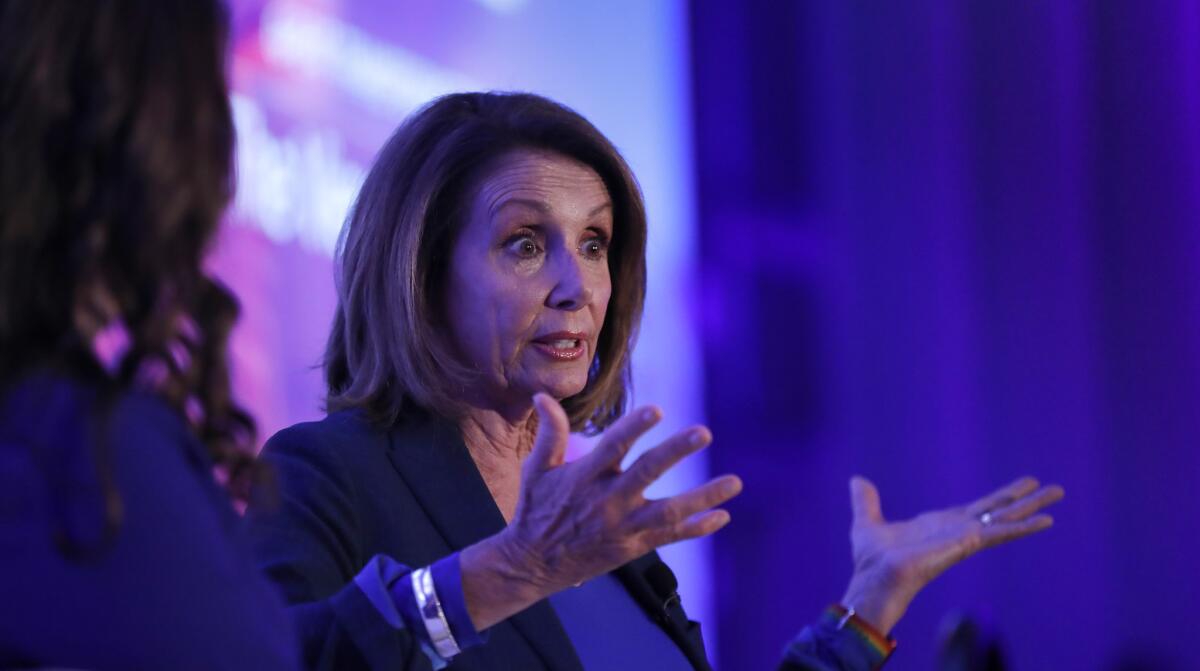Drug price controls have more support in Washington than ever. It’s probably not enough

- Share via
House Speaker Nancy Pelosi’s long-awaited prescription drug legislation has drawn much attention for its relatively modest proposal to have Medicare negotiate with drugmakers over the price of no more than 250 high-cost drugs per year. What’s more interesting — because it has a better chance of becoming law — is the bill’s proposal to cap annual price increases for all drugs covered by Medicare at no more than the rate of inflation.
I say it has a better chance of becoming law because the same provision is in the bipartisan bill by Sens. Charles E. Grassley (R-Iowa) and Ron Wyden (D-Ore.) that the Senate Finance Committee has advanced, and that President Trump has explicitly endorsed:
But a “better” chance of becoming law doesn’t mean a good one. That’s because Republicans aren’t (gasp!) marching in lock step with Trump on this issue. Instead, they’re sticking to their economic principles. Or if you want to be less charitable, they’re bowing to the interests of Big Pharma.
The drugmakers’ arguments against any form of price controls, whether they take the form of price caps or forced negotiations, boil down to this: Artificially limiting profits will limit the amount of investment in drug research and development, which in turn will mean fewer new cures. It’s a stark formulation: Price controls will kill people.
Although it’s a self-serving argument, the drugmakers’ contention about price controls’ effect on R&D has been borne out by some researchers. The best ripostes come from those who question whether we’re getting enough from all that R&D to justify how much higher prices are than the value delivered.
Republicans and free-market-oriented Democrats (yes, they exist!) don’t like price controls because they distort the market, potentially driving investment away from where it would yield the most good for society. The healthcare market, however, doesn’t play by the usual rules, and that’s particularly true for prescription drugs. Entry is severely limited by the Food and Drug Administration, patents shield new drugs from competition, obscure conditions may desperately need treatments yet offer only limited sales, the people who need the drug are typically not the ones who pay most of its cost — the market is already distorted in more ways than you can count.
I’m torn on this, given my own skepticism about price controls. On the one hand, limiting price increases could be a valuable tool against the skyrocketing costs for some drugs, such as insulin. On the other, drugmakers might set the initial price of breakthrough products even higher to make up for the restraint on price growth. That could drive insurers (including Medicaid and Medicare) to limit access to those drugs even more than they do now.
Pelosi would put a lid on initial prices too, at least for the 25 to 250 patent-protected drugs Medicare would be allowed to negotiate prices for annually. That cap — which would limit the prices any buyer in the U.S. paid, not just those on Medicare — would be tied to the prices in other major industrialized nations. That echoes a proposal Trump unveiled months ago, but it’s nowhere to be found in the Grassley-Wyden bill.
Assuming progressive Democrats who wanted a more aggressive bill won’t abandon Pelosi’s proposal, the speaker should be able to get her bill through the House. That means the main roadblock on this, as in so many things, is Senate Majority Leader Mitch McConnell (R-Ky.), who has shown no interest in letting the Senate vote on measures that many members of his party oppose.
So despite the unusual degree of agreement across partisan lines and across the two chambers of Congress, the idea of putting a ceiling on prescription drug price increases looks like a long shot. Let’s see how long and how hard the president, who promised to tackle rising drug prices, keeps beating the drum for Grassley’s bill and its price controls.
More to Read
Updates
9:41 a.m. Sept. 21, 2019: This post was updated to add a better link to the Pelosi bill and to clarify that Medicare would be empowered to negotiate the price of 25 to 250 drugs each year.
A cure for the common opinion
Get thought-provoking perspectives with our weekly newsletter.
You may occasionally receive promotional content from the Los Angeles Times.










